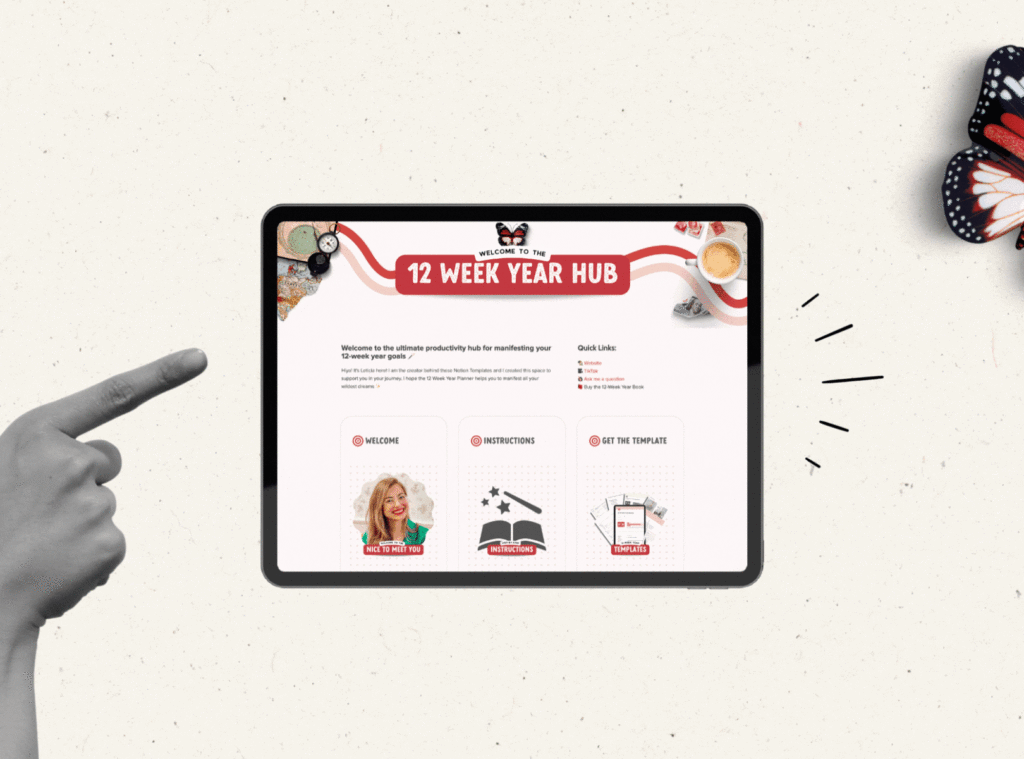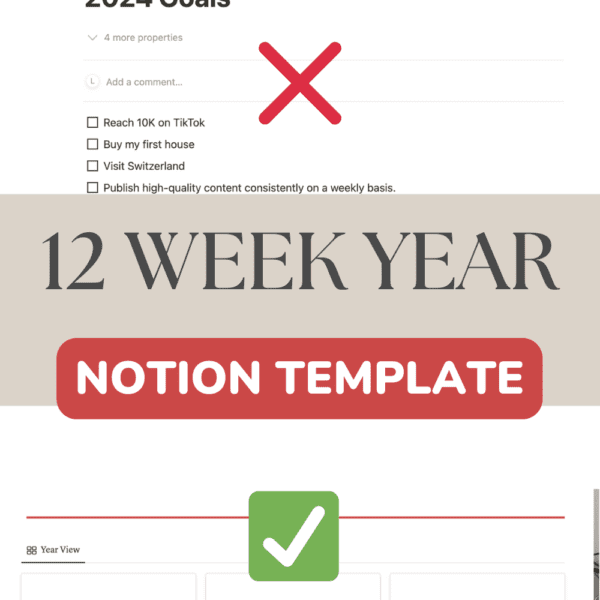Learn about the 12-Week Year system and how it can help you achieve your goals in just 12 weeks without overwhelm.
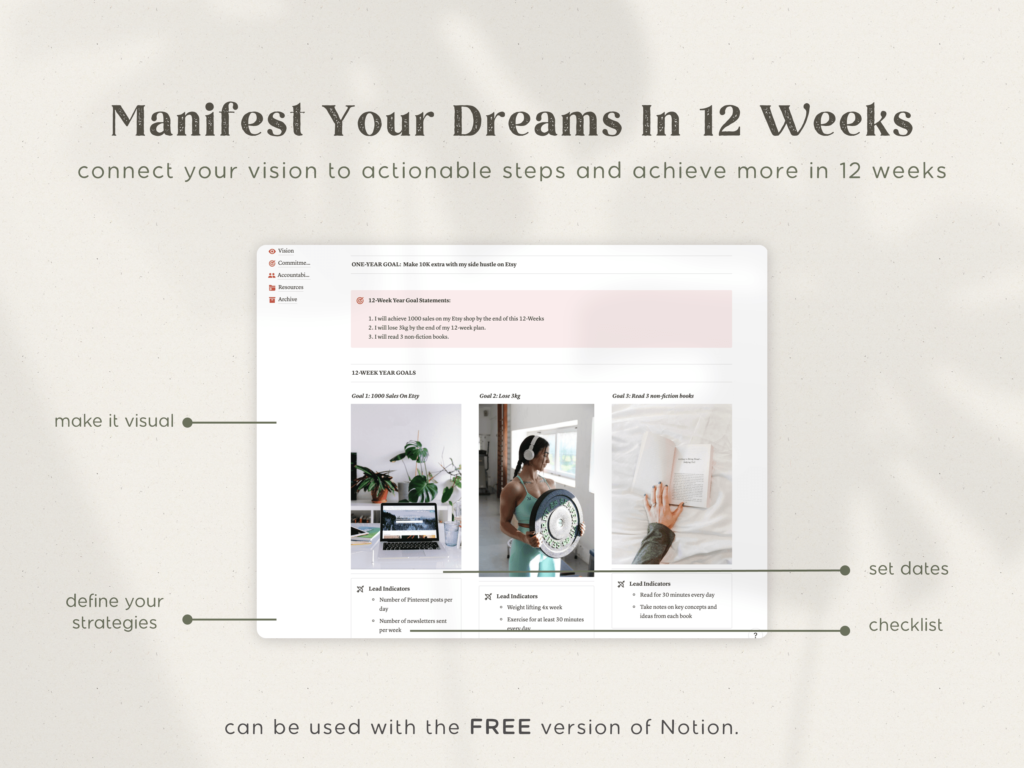
Are you struggling to achieve your goals? Do you feel like you’re not making progress towards the things that matter to you? If so, you’re not alone.
Do you often find that your annual goals are never fully realized, leaving you frustrated and uncertain about the future?
For me, the problem wasn’t even setting goals, it was following through on them. As a creative, I constantly have billions of ideas in my mind, and I want to pursue all of them at once. I know it’s crazy, but the issue is time.
Regardless of how much money you make, where you live, or where you come from, we all have limited time. We have 24 hours in a day, minus 8 hours of sleep and 8 hours of work (if you work full-time). This leaves you with 8 hours to eat, exercise, work on your dreams, and enjoy leisure time.
My 12-Week Year Journey
After trying every goal-setting method under the sun, I finally found one that works for my creative brain.
I discovered the 12-Week Year through a YouTube video and immediately ordered a copy of the book from Amazon. After reading it in less than a week, I created my own template in Notion.
The 12-Week Year is a scientifically proven method that can help you achieve your goals and boost your productivity. By breaking down your annual goals into 12-week cycles, you can stay focused, motivated, and on track to achieving your long-term objectives.
Even though I didn’t achieve all my goals every round, the method worked really well for me.
In this document, I will share everything I learned about this method and the truth about my 12-Week Year journey.
Here you can see my 12 Week Year Plan for the first quarter of 2023:
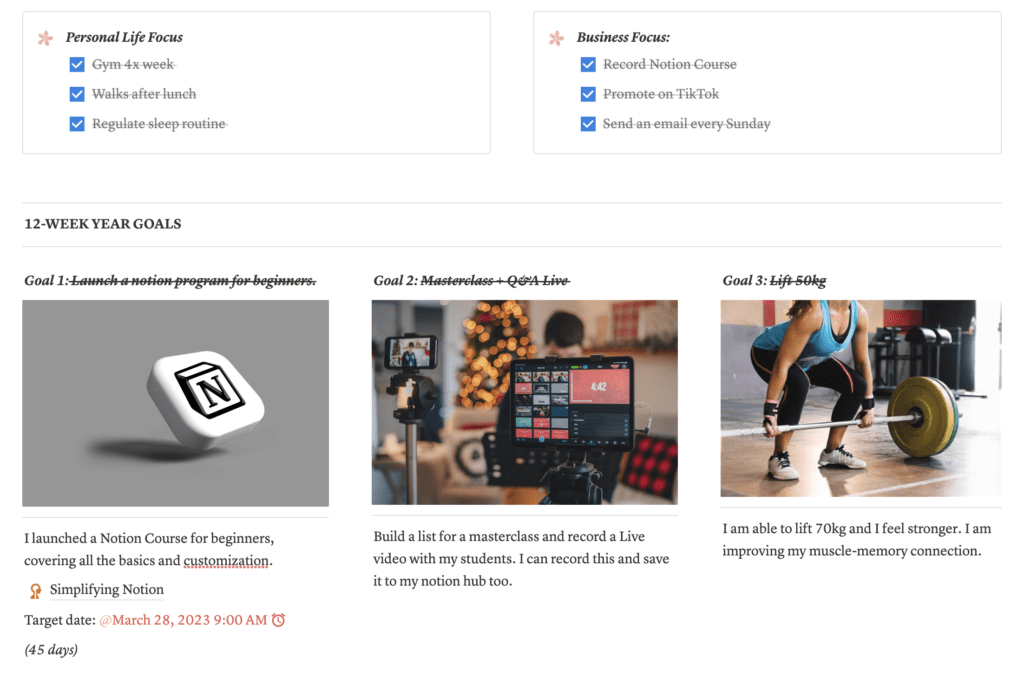
The Problem with Annual Goals
Many small business owners use annual goal-setting as a common strategy. However, this approach can often lead to procrastination and a lack of motivation.
Annual goals can stifle creativity.
Setting goals with 3-month cycles gives you space to follow your intuition, creativity, and keeps you excited to work in your business.
At the beginning of the year, you are one person, but by the end of the year, you can be a completely different and evolved version of yourself.
If I had followed my goal for 2021, which was becoming a nurse, I would be unhappy today and have limited freedom. Instead, I work mostly from home, create fun things, and make passive income while doing things I love.
Don’t try to fit yourself in a box.
Follow what excites you.
Also, when we set goals for an entire year, it’s easy to become complacent and believe we have plenty of time to achieve them.
This procrastination can lead to cramming and stress as the year-end approaches. Looking back, you may realize that you didn’t make progress on the things that really matter to you.
The Solution: The 12-Week Year
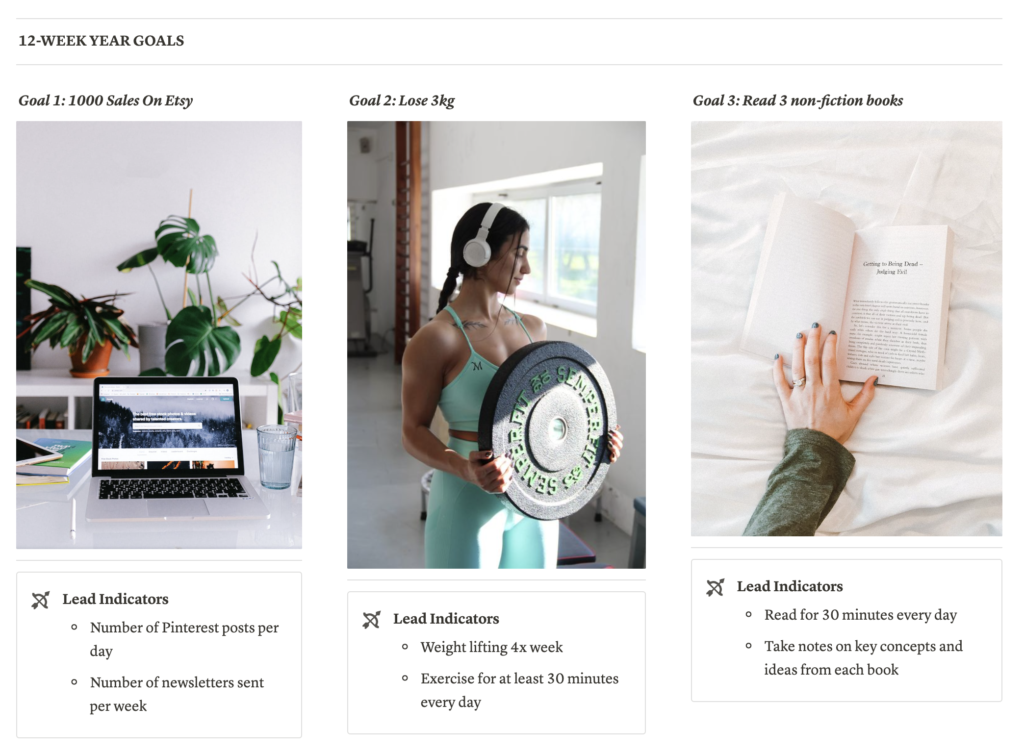
What is the 12 Week Year?
The 12-Week Year is a scientifically proven method that helps you achieve your goals and boost your productivity. This approach involves breaking down your annual goals into 12-week cycles. By focusing on shorter timeframes, you can maintain momentum, stay motivated, and achieve more than you ever thought possible.
You can choose the goals that excite you, make progress, take a break, reflect, and repeat. This sustainable approach keeps you energized while working towards your goals, while respecting where you are and following your desires.
Why the 12-Week Year Method Works (Science-Based)
Parkinson’s Law is the principle that work expands to fill the time we give it. Researchers have studied this principle and found that people who have less time to do a task are more productive and make fewer mistakes than those who have more time.
In one study, participants were asked to copy a text passage within a set amount of time. Some had more time than others. The results showed that those who had less time were more productive and made fewer mistakes.
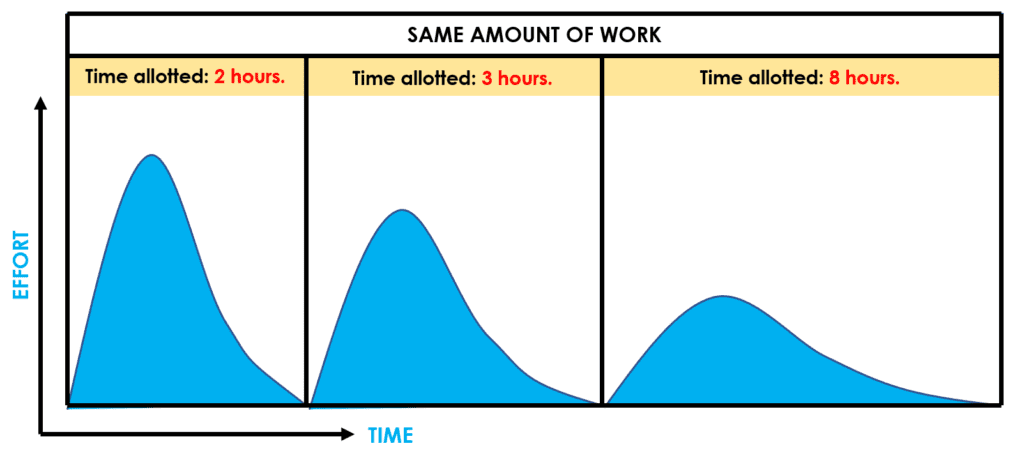
| Illustration of efforts as a function of time, demonstrating Parkinson’s Law. Inspired by: https://www.consuunt.com/parkinsons-law/ |
Another study found that people who set short-term goals are more motivated and persistent than those who set long-term goals. This study supports the idea that setting short-term goals can lead to greater motivation and productivity.
Moreover, studies have shown that the 12-Week Year is an effective way to achieve your goals. Research has found that people who set 12-week goals achieve more than those who set annual goals.
Understanding the 12-Week Year
The 12-Week Year is based on the concept of periodization.
12 weeks is a year.
Every week is a month.
Every day is a week.
This method helps you act intentionally every day.
The 12-Week Year is a goal-setting method that involves breaking down larger goals into smaller, more manageable cycles. To implement this method, set emotionally-connected goals that align with your long-term vision. Then, break those goals down into smaller tasks that can be accomplished within 12 weeks.
The key to this method is tracking progress and making adjustments along the way. Regularly reviewing progress can help you stay on track and make necessary changes to reach your goals. The 12-Week Year can be applied to both personal and business goals. Small business owners have successfully used it to increase productivity, revenue, and profitability. The method is also flexible and can be customized to meet individual needs and preferences, especially when using Notion.
Creating a 12-Week Year Plan
Establishing Your Vision

Establishing a vision is the crucial first step in the 12-Week Year method. It provides motivation and direction for the goal-setting process.
Take some time to reflect and think about what you truly desire. You have the roadmap inside you. Contemplate how you want to feel and what excites you.
Long-Term Vision
- What do you want to accomplish in your lifetime?
- What kind of legacy do you want to leave behind?
- What do you want to be remembered for?
- How do you want to impact the world?
- How do you want to feel?
- What is your financial goal?
Example: “I aspire to build a thriving online business that grants me financial freedom and the flexibility to work on my own terms. I will utilize my skills and expertise to aid others and make a positive impact on the world.“
3-Year Vision
Based on your long-term vision, what do you want to create in the next 3 years?
- What are the specific goals you want to accomplish?
- How do these goals contribute to your long-term vision?
- What are the milestones you need to hit in order to achieve these goals?
- What resources will you need to accomplish these goals?
- Who will be involved in helping you achieve these goals?
Example: “In the next 3 years, I will have a thriving online business that allows me to work from anywhere in the world. My business will generate a steady stream of passive income and allow me to pursue my passion for travel and adventure. I will also create an online community of like-minded individuals who support and inspire each other.”
12-Week Vision
To create a 12-week plan, begin by identifying the goals you want to achieve over the next 12 weeks. Prioritize your goals based on their level of importance and focus on the ones that will have the greatest impact on your life and business.
Here are some prompts to help you get started:
- What are the top 3-5 goals you want to achieve in the next 12 weeks?
- What specific actions can you take to achieve each goal?
- What deadlines can you set for each action?
- What resources will you need to achieve your goals?
- How will you track your progress and hold yourself accountable?
- How will you celebrate your successes along the way?
For example, “In the next 12 weeks, I will launch my online business and generate my first $500 in revenue. I will create a website and social media presence, develop a marketing strategy, and identify my target audience. I will also invest in my personal development by taking courses on entrepreneurship and digital marketing.”
Identifying Goals
Identify the goals you want to achieve over the next 12 weeks. Choose up to three goals to work on for the next three months.
When writing your goals, ask yourself, “How will my life be different if I accomplish those goals?” Prioritize your goals based on their level of importance and focus on the ones that will have the greatest impact on your life and business.
How to choose your goals? Write a list of all the ideas you have to work on and circle the three that excites you the most.
Approach your business as a way to grow yourself and overcome your limits.
Plan of Action
After identifying your goals, it’s important to create a plan of action that includes specific tasks and deadlines to help you achieve those goals. A planner can be a helpful tool for this, whether it’s a notebook or a digital planner.
Break down each goal into smaller, manageable tasks and set dates for each one. Consider any habits you could implement to support your goals, and adapt your environment accordingly. For example, if you want to cultivate a reading habit, create a cozy space in your home for reading and establish a mini ritual around it.
Here you can see a snapshot of a plan of action for one of my 12 week year goals. I used this timeline view in the Notion App so I can view the entire month in a glance and all that I have to do for each goal.
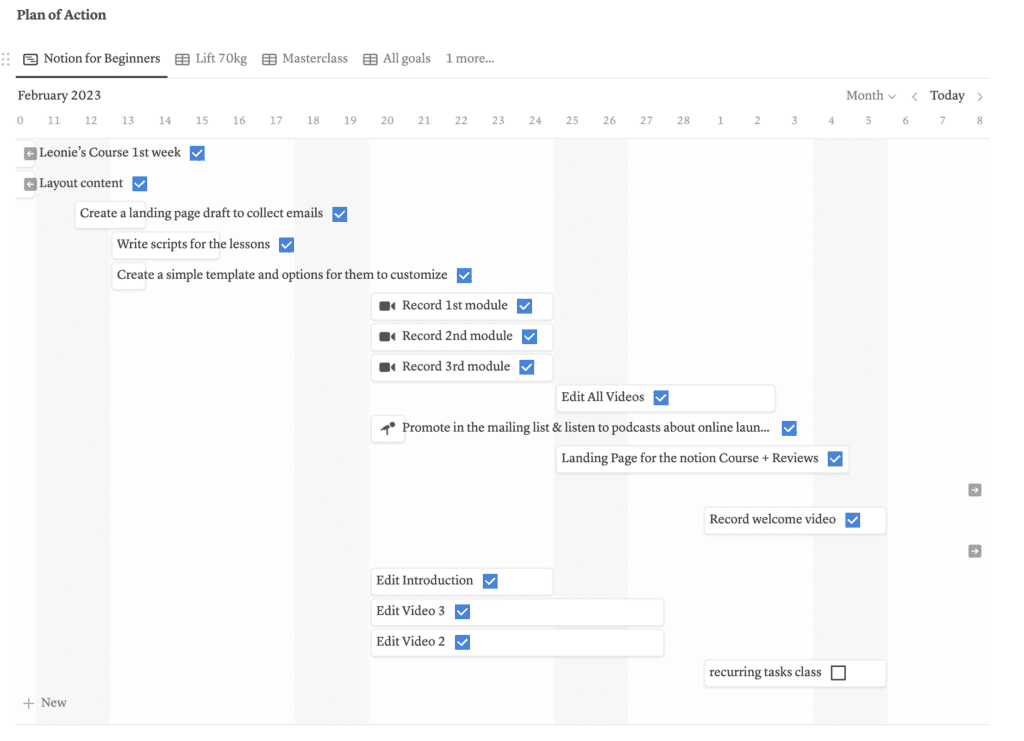
“If you don’t go after what you want, you’ll never have it. If you don’t ask, the answer is always no. If you don’t step forward, you’re always in the same place.”
Nora Roberts
Implementing the 12-Week Year
Staying accountable to your goals is crucial to achieving success with the 12-Week Year.
If you just plan and forget about it, nothing will happen.
I am a crazy post-it lady, so I stick post-its with my goals and intentions throughout the house, even in the bathroom.
Remember to track your progress regularly and adjust your plan if necessary. Doing this will help you identify any obstacles that might be preventing you from achieving your goals and find solutions to overcome them.
Also, celebrating your wins is just as important! Acknowledging and celebrating your progress will keep you motivated, and it also increases your self-confidence.
Your actions carry energy. Each time you make the move to bring your ideas to life, you are showing yourself that you are capable, that you can trust yourself to get things done.
Get things done with intention. You’re creating your dream life.
Think about ways that you can make this journey exciting and enjoyable.
I enjoy creating playlists to help me work on my 12-week year goals, journaling, and visualization. I also like to have my favorite drink in my favorite mug while working on these activities.
It’s not what you know; it’s not even who you know; it’s what you implement that counts.
12 Week Year –
Tips for Implementing the 12-Week Year
- Check off tasks when completed to get a quick boost of dopamine.
- Set a specific day of the week to review progress from the previous week.
- Start small: If you’re new to the 12-Week Year, begin with a modest goal to get a sense of the process.
- Be realistic: Ensure your goals can be accomplished within a 12-week time frame. Avoid setting yourself up for failure by establishing unrealistic goals.
- Consider having an accountability partner for weekly meetings (optional).
“You are 7 times more likely to be successful if you participate in some form of peer support” -12 Week Year
The Benefits of the 12-Week Year
Studies have shown that people who use this approach are more productive, focused, and motivated. Additionally, people who set shorter-term goals are more likely to achieve them and feel a greater sense of accomplishment.
In the world of small business, where time is precious, the 12-Week Year can be especially beneficial. By focusing on shorter timeframes, you can achieve more in less time, freeing up more time to focus on other important aspects of your business.
Increased Productivity
By focusing on achieving goals within a shorter timeframe, you’re forced to prioritize and work more efficiently, which can lead to increased productivity.
Greater Clarity and Focus
The system requires you to identify and prioritize your goals, which can lead to greater clarity and focus on what’s truly important.
Improved Accountability
The system includes regular check-ins and progress reviews, which can help improve accountability and ensure that you’re staying on track.
Better Adaptability
By breaking your year down into shorter segments, you’re better able to adapt to changes and adjust your goals and plans as needed.
Increased Self-Confidence
As you make progress towards your goals and follow the plan, it increases your self-confidence and helps you conquer impostor syndrome.
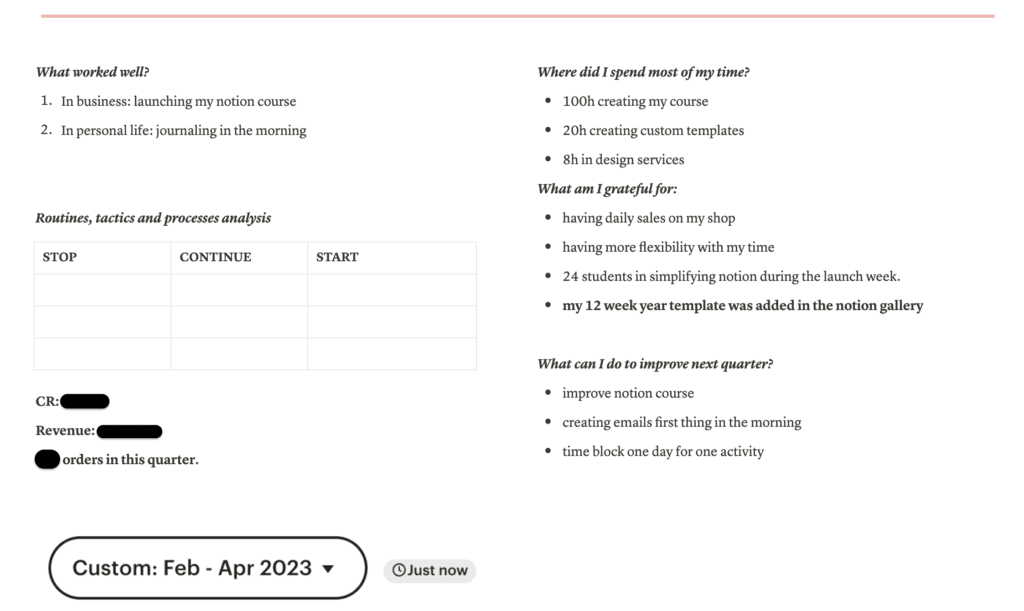
Tips for Success with The 12-Week Year

1. Set Specific Goals
Get as specific as you can in your goals.
2. Break Goals Down into Smaller Tasks
Breaking your goals down into smaller, manageable tasks can make them feel more achievable and help you stay motivated.
3. Have a Separate 12-Week Year Planner
Have one place to plan and organize your 12-week year journey and don’t mix it with your other plans if possible. This helps you stay focused. Add a time block in your personal calendar to work on your 12-Week year plan.
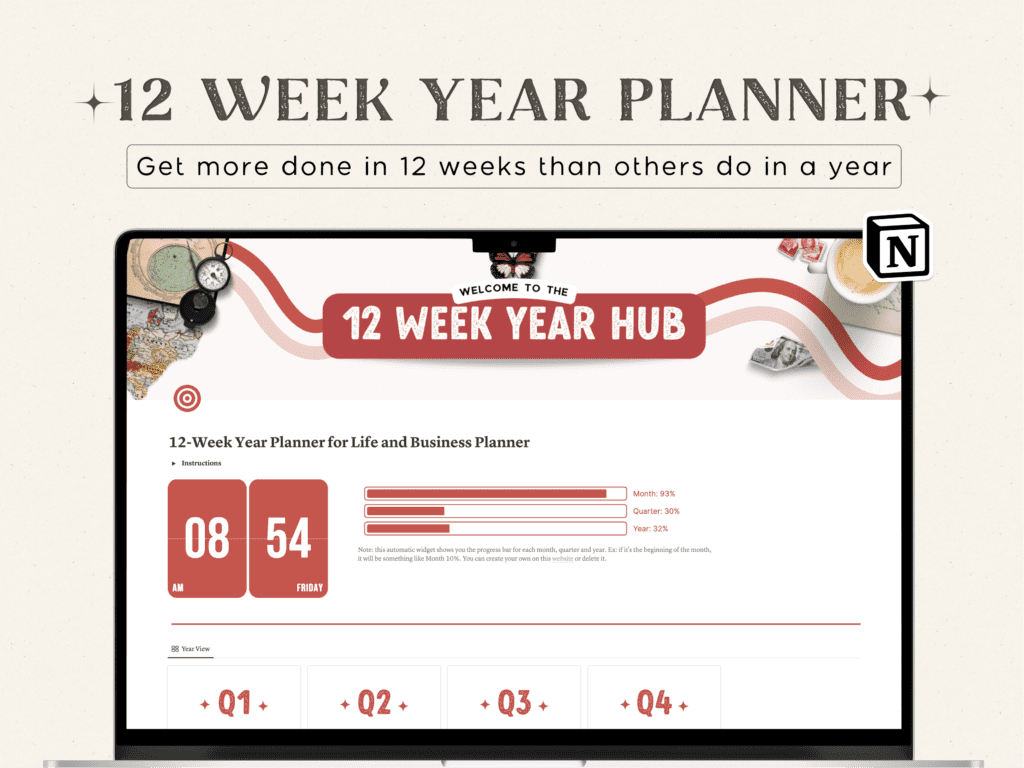
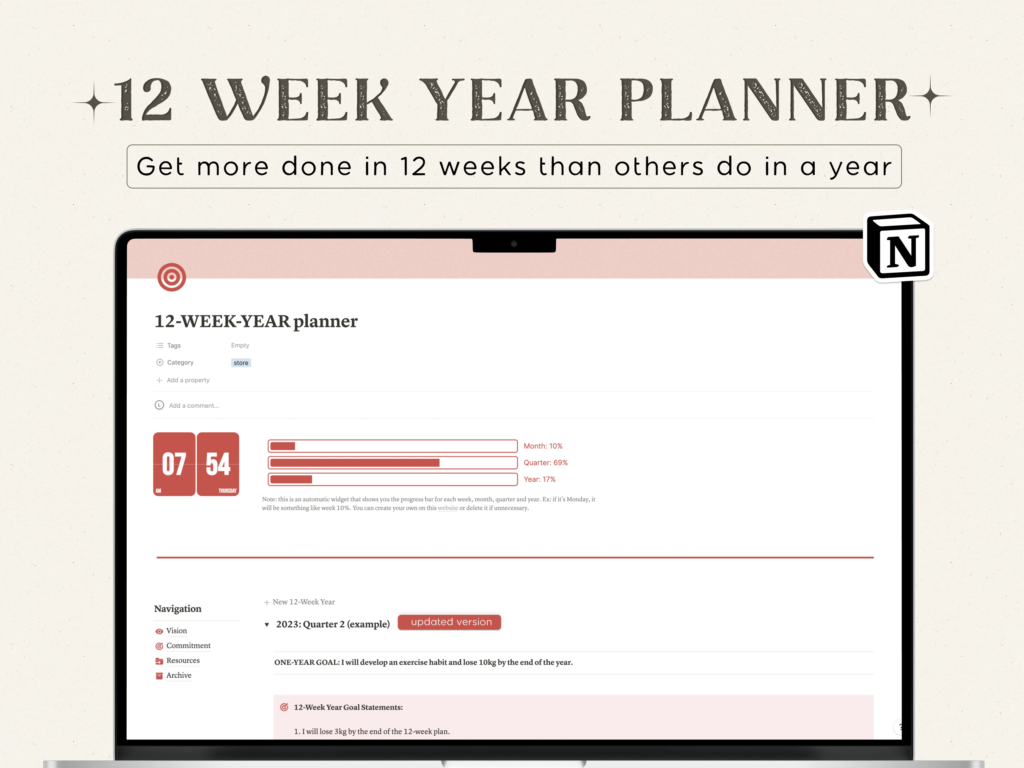
4. Stay Focused
Staying focused and avoiding distractions is key to achieving success with The 12-Week Year.
5. Prioritize Your Tasks
Prioritizing tasks based on their importance and urgency can help you make the most of your time and energy. When I tried it for the first time, I only had 4 hours a week to work on my 12-week year goals, so I couldn’t do everything I planned. However, I managed to complete all the essential tasks.
Is this the right method for you?
You’ll never know if you don’t try.
There’s no right or wrong way to do it.
Allow yourself to be messy and try new planning methods.
I’ve always enjoyed planning, but execution was a major obstacle for me due to psychological roadblocks.
As a perfectionist with imposter syndrome, I struggle to complete tasks, which has had a significant impact on my confidence.
When I assessed all my unfinished projects, I felt terrible.
What’s the point of starting so many things if I don’t believe I’m capable of finishing them and releasing them to the world?
After investigating why I was doing this, I realized it wasn’t due to laziness or procrastination, nor was it because I was incapable of finishing.
It was because I was afraid of judgment, rejection, and failure. Not finishing a project was my way of protecting myself from the pain of failure and judgment.
Why aren’t you finishing what you start? Dig deeper and be honest with yourself.
Recommended reading: Finish What You Start – Peter Hollins
The 12 Week Year Method will probably work for you if:
- You are struggling to stay focused in a few key areas.
- You don’t feel like you are making progress on anything.
- You start many projects but don’t actually finish them.
- You are a person who takes full responsibility for your life.
Conclusion
In conclusion, the 12-Week Year is a powerful productivity system that can help you achieve your goals and boost your productivity. By focusing on shorter time frames and breaking your goals down into smaller, more manageable tasks, you’ll be able to stay motivated, accountable, and on track.
Remember, the 12-Week Year is flexible and adaptable, and you can adjust your goals and plans as needed. However, it’s important to stay committed and hold yourself accountable, even when things get tough. By doing so, you’ll be able to make steady progress towards the things that matter most to you.
If you’re looking for a way to take your productivity to the next level and achieve your goals more effectively, give the 12-Week Year a try. With this powerful system on your side, there’s no limit to what you can achieve.
Frequently Asked Questions
What if I don’t achieve my 12-week goals?
If you don’t achieve your 12-week goals, take time to assess why you didn’t achieve them. Did you set unrealistic goals? Did you fail to prioritize your tasks effectively? Once you know why you didn’t achieve your goals, adjust your plan and try again in the next 12-week period.
Can I use the 12-week year method for personal goals?
Absolutely! The 12-week year method can be used for both personal and professional goals.
12 Week Year Planning Checklist
[ ] Read “The 12-Week Year” book
[ ] Write down your vision
[ ] Create a 12-Week Year plan
[ ] Identify goals for the next 12 weeks
[ ] Prioritize goals based on importance
[ ] Create a plan of action with specific tasks and deadlines
[ ] Track progress regularly and adjust plan if necessary
[ ] Take a break to celebrate progress and wins
Ready to take your business to the next level with the 12-Week Year method?
Start implementing these strategies today and see the results for yourself!
Set your 12-week goals, break them down into manageable tasks, track your progress, and hold yourself accountable.
With focus and determination, you can achieve anything you set your mind to.
